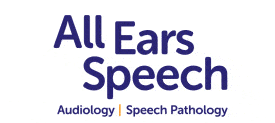Audiology Referral
Hearing Services
Referrals can be made online, or via email, fax or mail. We also accept self-referrals. Please see Our Fees for possible funding sources.
Medical Referrals (General Practitioners (GP), ENT Specialists, other Medical Officers)
All hearing assessments at All Ears & Speech are comprehensive and include, where clinically appropriate, the following:
- Air conduction audiogram to determine hearing thresholds
- Bone conduction audiogram where a hearing loss is indicated to determine site of lesion
- Speech audiometry to evaluate one’s ability to discriminate between subtle differences in speech sounds and determine functional hearing
- Impedance audiometry to assess middle ear health (tympanometry) and integrity of the acoustic nerve (acoustic reflex)
- Otoacoustic emissions to assess cochlear function
Please indicate on your referral should there be any contraindications to the above, or if you wish for the assessment to be altered in any way.
A detailed report will be sent following completion of the assessment.
Your client may be a good candidate for cochlear implantation if, with conventional hearing aid(s), they continue to;
- Require information to be repeated in quiet
- Mishear and respond incorrectly to questions asked
- Have ongoing difficulties communicating and keeping up at work
- Feel exhausted due to the extra effort they require to listen and attend
- Avoid social activities (becoming increasingly more withdrawn)
- Rely on visual information (i.e. lip reading)
Bone anchored hearing solutions are typically recommended when there is a large middle ear component to a client’s hearing loss
(i.e. > 30dBHL):
- Conductive Hearing Loss (i.e. middle ear pathology that cannot be surgically repaired and where a conventional hearing aid is not an option). Baha is considered as the hearing solution of choice when there is on average a conductive component of 30dB.
- Single-sided deafness (i.e. a profound sensorineural hearing loss in one ear where conventional hearing aids provide little or no benefit). This hearing solution will enable sound to be detected from both sides however it does not restore binaural hearing (i.e. listening with both ears).

